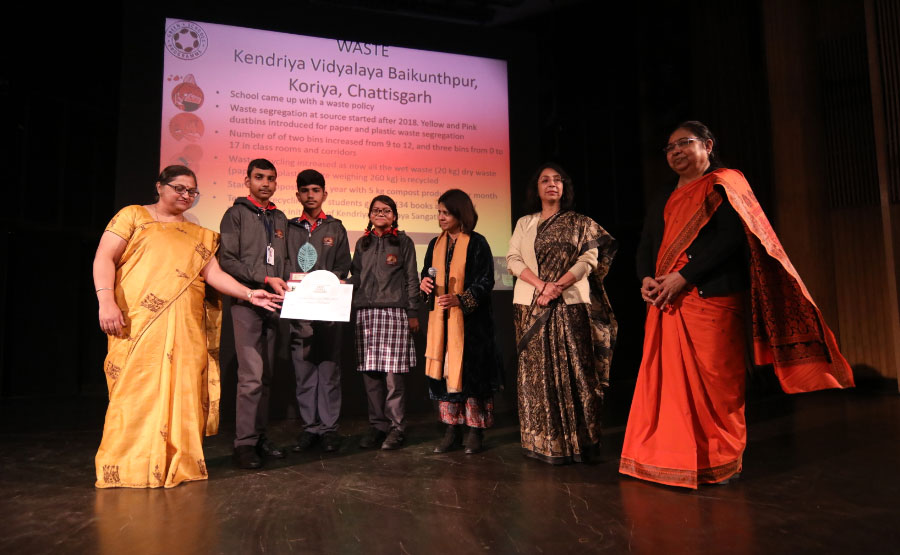CSE honours 172 schools with Climate Change Awards for 2019
- Over 1,700 schools vie for top honours in CSE’s rigorous environmental audit exercise under the Green Schools Programme (GSP)
- Andhra Pradesh at the top, for having the highest number of schools that registered and submitted audit reports
- Chittoor district adjudged the best – 16 schools earn the ‘green’ tag
- 2019-20 GSP audit focused on the global threat of climate change
New Delhi, February 6, 2020: Andhra Pradesh has emerged as the top state in the list of honour rolls for the 2019 Green Schools awards, which are given away by Centre for Science and Environment (CSE) to schools across the country who undertake a rigorous environmental audit exercise to minimise their resource footprints. The state’s Chittoor district received the award for the ‘best district’, with 16 schools in it rated ‘green’.
The awards were given away by CSE director general Sunita Narain at a ceremony organised here today. Speaking at the awards function, Narain said: “The Green Schools Programme (GSP) was launched by CSE to initiate and strengthen the tools of ecological literacy in schools. It aims to support and hand-hold schools in the country to enable them to transition to greener infrastructure and practices. It is truly heartening to see that the number of schools that are proactively moving towards this transition has been going up every year.”
The GSP audit
The GSP awards ceremony is organised every year as a culmination of the rigorous environmental audit exercise that schools undertake between July and November. Says Ranjita Menon, programme director, environment education, CSE: “The GSP audit exercise provides students the opportunity to minimise the usage of resources within the school premises and opens up avenues for activity-based environment education.”
The audit has six sections: air, energy, food, land, water and waste -- together, they aim at providing a holistic picture of resource efficiency. The 2018-19 audit exercise has made a conscious effort to connect all the various issues under these sections to climate change. Elaborates Menon: “Through awareness on carbon emissions, clean sources of energy, food consumption, biodiversity, rainwater harvesting and segregation of waste, the audit paves the path for schools to combat climate change at the local level and progress towards transforming into a sustainable campus.”
About 6,000 schools from all over India – including some from remote regions -- are part of CSE’s Green Schools network today. This year’s audit received complete reports from 1,704 of these schools – and out of these, 172 made it to the roll of honours.
Menon says that “the GSP programme has been able to bring about measurable practice changes in schools – such as increase in water table, reduced electricity bills through energy conservation and gradual shift to renewable energy, 100 per cent segregation of waste at source, increased green cover, move to sustainable modes of transport, etc.”
The data that has emerged after the 2018-19 audit shows that
- 82 per cent of the schools that submitted the audit report segregate waste at source and ban selling of packaged foods in the school premises;
- 79 per cent do not use or own vehicles;
- 48 per cent practice rainwater harvesting;
- 12 per cent are using alternate sources of energy.
The 2019 awards
For the third consecutive year, Andhra Pradesh has been awarded for being the state with the highest registrations and report submissions. More than 300 schools from the state submitted their audit reports, with 22 schools being rated ‘green’ – 16 of them in Chittoor alone. Ramesh Kumar Suman, director, Andhra Pradesh National Green Corps (APNGC), received the state’s award.
Changemaker schools: Those that have monitored their resource use over the years and made significant improvements to move towards an efficient manner of functioning. Says Menon: “These schools convey the essence of the GSP audit, which is to evaluate, monitor, and improve resource usage over a period of time.” This year’s changemakers are:
- Montfort Valley Sr. Sec. School, Murickumthotty, Kerala
- Satya Bharti School, Bari Khas, UP
- Shivalik Valley School, Solan, Himachal Pradesh
- Sr. Sec. School-Chail, Solan, Himachal Pradesh
Green-in-a-row schools:Those that have managed to sustain their green performance for three or more years while continuously moving towards more sustainable means by being environmentally-astute.
- Gyanodaya Vidya Mandir, Damoh, Madhya Pradesh
- East Point School, Delhi
- Mount Litera Zee School, Jamshedpur, Jharkhand
- Salwan Public School, Ghaziabad, UP
- Edmund's School, Jaipur, Rajasthan
- Bal Bharati Public School, IMT Manesar, Haryana
- Motilal Nehru School of Sports, Rai, Haryana
- George’s School, New Delhi
- The Pinnacle School, New Delhi
- Bal Bharati Public School, Noida, UP
New entrants:Schools that have participated in the audit for the first time and shown tremendous potential.
- Adhyapana School, Madurai, Tamil Nadu
- Govt Sr. Sec. School, Kujji, Himachal Pradesh
Section toppers:
- Air: ZPHS, Gopalakrishna Puram, Andhra Pradesh
- Energy: Kendriya Vidyalaya, Fatehgarh Sahib (RU), Punjab
- Food: Sachdeva Global School, New Delhi
- Land: GHS, Dugha, Himachal Pradesh
- Waste: Kendriya Vidyalaya, Baikunthpur, Chhattisgarh
To reach the GSP team at CSE or know more about the awards, please contact Sukanya Nair of The CSE Media Resource Centre, sukanya.nair@cseindia.org, 88168 18864.





Share this article